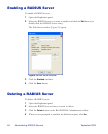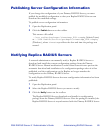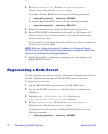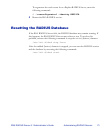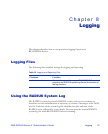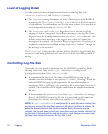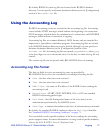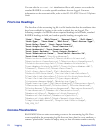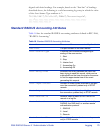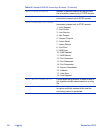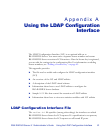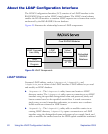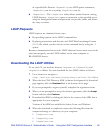76 Logging September 2005
Level of Logging Detail
You can control the level of detail recorded in the system log files with
LogLevel, LogAccept, and LogReject settings.
X The LogLevel setting determines the level of detail given in the RADIUS
system log file. The
LogLevel can be 0, 1, or 2, where 0 is the least amount
of information, 1 is intermediate, and 2 is the most verbose. It is specified in
the [Configuration] section of
radius.ini file.
X The LogAccept and LogReject flags allow you to turn on or off the
logging of Access-Accept and Access-Reject messages in the log file. These
flags are set in the [Configuration] section of
radius.ini: a value of 1 (the
default) causes these messages to be logged, and a value of 0 causes the
messages to be omitted. An Accept or Reject is logged only if LogAccept or
LogReject, respectively, is enabled and the LogLevel is “verbose” enough for
the message to be recorded.
The
TraceLevel setting specifies whether packets should be logged when they
are received and being processed, and what level of detail should be recorded in
the log.
Controlling Log File Size
Optionally, you can specify a maximum size for a RADIUS system log file by
entering a non-zero value for the
LogfileMaxMBytes setting in the
[Configuration] section of the
radius.ini file.
X If a maximum file size is set, the name of the RADIUS system log file
identifies the date and time it was opened (
YYYYMMDD_HHMM.log). When the
current RADIUS system log file approaches the specified number of
megabytes (1024 x 1024 bytes), the current log file is closed and a new one is
opened. The closed file will be slightly smaller than the specified maximum
file size.
X If the maximum file size is set to 0 (or if the LogfileMaxMBytes setting is
absent), the RADIUS system log file size is ignored and log file names are
datestamped to identify when they were opened (
YYYYMMDD.log).
NOTE: If LogFileMaxMBytes is configured for a small non-zero number, the
log file may exceed the specified maximum file size in less than a minute. To
avoid file name collisions (two log files created during the same minute
interval), the log info does not roll over more than once per minute. Instead, the
log file size is ignored until the minute precision clock changes to ensure that
log files have unique file names. No log data is lost.



